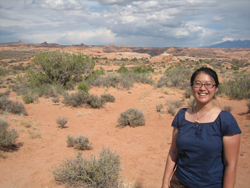Yi-Hsin Erica Tsai

I am a postdoc in the Department of Ecology and Evolutionary Biology at the University of Colorado Boulder.
I’m also the developer of PhyloGeoViz, a phylogeography visualization tool.
Get in touch: yihsin.erica.tsai@gmail.com
I study the migration patterns of communities in response to climate change. For my dissertation, I focused on a host-parasite system, and elucidated what factors constrained the post-glacial colonization of the parasitic plant, Epifagus virginiana. In my postdoc, I am synthesizing genetic data, fossil pollen, and ecological niche models to understand the assembly of a suite of eastern North American tree species.
News:
- I just moved back to Colorado! I’m working remotely from Boulder. If you find yourself in Colorado, let’s meet up!
- I spoke as an Oosting Fellow at the Oosting Memorial Symposium several years ago. Check out slides from the talk.
Research Interests
Current focus:
Comparative phylogeography, population genetics, and invasion biology of parasitic plants and their hosts.
General interests:
Evolutionary biology, biogeography, phylogeography, landscape genetics, symbiotic interactions, disease population dynamics, ecology, genome evolution, chloroplast and other organellar evolution.
Read more.
Dissertation Research Project
The post-glacial colonization history and present-day population dynamics of the parasitic plant, Epifagus virginiana
The goal of this project is to understand how parasites invade and persist in host populations. In particular, how parasite migration history and population structure are controlled by forces such as limited dispersal, host density effects, and local adaptation will be studied. Understanding how the migration patterns of parasites are constrained by their hosts is the first step in determining how closely associated species can influence each other’s spread. The study’s approach is historical and compares the post-glacial migration of a parasitic plant, Epifagus virginiana (beechdrop; Orobanchaceae), with its host, Fagus grandifolia (American beech; Fagaceae). Broad scale population structure analyses for E. virginiana will be performed to identify any patterns of co-migration, common glacial refugia or similar migration corridors between the parasite and host. At a fine scale, host density effects on parasite invasion and correlations between genotypes of host-parasite pairs will be examined as potential host mechanisms that limit parasite establishment. Experimental germination studies will also be done to test for local adaptation of parasites to certain hosts at a variety of geographic scales. This research will produce a comprehensive migration history of this parasite with an emphasis on what factors constrained its invasion and how the colonization patterns of host and parasite relate. These results will be applied to forecasting how assemblages of species (i.e. communities) respond to climate change.
Read more.